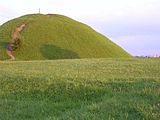|
Krakus | |
|---|---|
 | |
| Issue |
Krakus, Krak or Grakch was a legendary Polish prince, ruler of the Vistulans (a Lechitic tribe), and the presumed founder of Kraków. Krakus is also credited with building Wawel Castle and slaying the Wawel Dragon by feeding it a dead sheep full of sulfur. The latter is how Krak the cobbler became Krakus the prince, and later king. The first recorded mention of Krakus, then spelled Grakch, is in the Chronica seu originale regum et principum Poloniae from 1190.
Historian Jacek Banaszkiewicz [pl] attributes Krak's name to a pre-Slavic word "krakula", meaning 'judge's staff' or 'scepter', which also signified judicial authority among the pagan Balts. Historians Cetwiński and Derwich suggest a different etymology, which seems more probable to some, with Krak, meaning simply an oak, a sacred tree, most often associated with the concept of genealogy. Moreover, the name of the city of Kraków is believed to be derived from the word kruk, which translates to 'crow' or 'raven'.
Krakus Mound, which exists to this day, was previously believed to contain Krakus' remains. It has been the subject of thorough archeological research from 1934–38, however, no grave has ever been found in it. The mound has a diameter of over 50 meters. According to research, it was erected between the 8th and 10th centuries as a central element of an ancient grave site, which does not exist today.
The Krak and Princess Wanda legend appeared in the early Polish history written by Wincenty Kadłubek (Latin: Vincentius Cadlubkonis); a similar legend, that of Krok and Libussa, appeared in the early Czech history by Cosmas of Prague.
See also
- Princess Wanda, Krak's daughter
- Krakus II, Krak's son
- Lech II, Krak's son
- Artifacts related to the legend of Krakus
-
 Krakus Mound in the Podgórze district of Kraków
Krakus Mound in the Podgórze district of Kraków
-
 Krak from Chronica Polonorum
Krak from Chronica Polonorum
-
 Fire-breathing Smok Wawelski below Wawel Castle, slain in Krakus's days
Fire-breathing Smok Wawelski below Wawel Castle, slain in Krakus's days
-
 Krak and Dragon statue, 1929, in Old Town Kraków
Krak and Dragon statue, 1929, in Old Town Kraków
References
- Raymond, Adam K. (March–April 2012). "A Dragon for the Digital Age". Mental Floss. 11 (2).
- Nungovitch, Petro Andreas (2019). Here All Is Poland: A Pantheonic History of Wawel, 1787–2010. Lanham, Maryland: Lexington Books. p. 287. ISBN 9781498569125.
- "Krakowskie ABC - Magiczny Kraków". www.krakow.pl.
External links
- Krak or Krakus? at historycy.org (Polish)
- 'Krakus and the Dragon'. A puppet re-telling by the pupils of St. Mary's Primary, Gorleston
| Polish legendary rulers | |
|---|---|
| These rulers supposedly ruled in the Early Middle Ages. |
| Monarchs of Poland | |
|---|---|
| Legendary | |
| Proto-historic (before 966) | |
| Piast dynasty (966–1138) | |
| Fragmentation period (1138–1320) | Senior or Supreme Princes
|
| Přemyslid dynasty (1296–1306) |
|
| Restored Piast dynasty (1320–1370) | |
| Capet-Anjou dynasty (1370-1399) | |
| Jagiellonian dynasty (1386–1572) | |
| Elective monarchy (1572–1795) | |
| Duchy of Warsaw (1807–1815) | Frederick Augustus I |
| Romanov dynasty (1815–1917) | |
| |